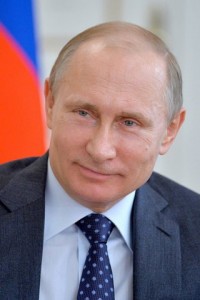 The Washington Post reports that “fake news” circulated before the election–such as reports of Hillary Clinton’s bad health, that the Clinton campaign paid anti-Trump protesters, and accounts of impending international crises–originated in Russia. Along with the hacked e-mails of the Democratic national committee, the disinformation campaign was designed to spread cynicism about the American system of government and to help in the election of Donald Trump.
The Washington Post reports that “fake news” circulated before the election–such as reports of Hillary Clinton’s bad health, that the Clinton campaign paid anti-Trump protesters, and accounts of impending international crises–originated in Russia. Along with the hacked e-mails of the Democratic national committee, the disinformation campaign was designed to spread cynicism about the American system of government and to help in the election of Donald Trump.
Russia tried similar operations during the Cold War, but this time its propaganda agencies have developed a sophisticated presence on the internet, allowing them to manipulate social media. So says researchers at the Foreign Policy Research Institute.
From Craig Timberg, Russian propaganda effort helped spread ‘fake news’ during election, experts say – The Washington Post:
“They want to essentially erode faith in the U.S. government or U.S. government interests,” said Clint Watts, a fellow at the Foreign Policy Research Institute who along with two other researchers has tracked Russian propaganda since 2014. “This was their standard mode during the Cold War. The problem is that this was hard to do before social media.”
The flood of “fake news” this election season got support from a sophisticated Russian propaganda campaign that created and spread misleading articles online with the goal of punishing Democrat Hillary Clinton, helping Republican Donald Trump and undermining faith in American democracy, say independent researchers who tracked the operation.
Russia’s increasingly sophisticated propaganda machinery — including thousands of botnets, teams of paid human “trolls,” and networks of Web sites and social-media accounts — echoed and amplified right-wing sites across the Internet as they portrayed Clinton as a criminal hiding potentially fatal health problems and preparing to hand control of the nation to a shadowy cabal of global financiers. The effort also sought to heighten the appearance of international tensions and promote fear of looming hostilities with nuclear-armed Russia.
Two teams of independent researchers found that the Russians exploited American-made technology platforms to attack U.S. democracy at a particularly vulnerable moment, as an insurgent candidate harnessed a wide range of grievances to claim the White House. The sophistication of the Russian tactics may complicate efforts by Facebook and Google to crack down on “fake news,” as they have vowed to do after widespread complaints about the problem.
There is no way to know whether the Russian campaign proved decisive in electing Trump, but researchers portray it as part of a broadly effective strategy of sowing distrust in U.S. democracy and its leaders. The tactics included penetrating the computers of election officials in several states and releasing troves of hacked emails that embarrassed Clinton in the final months of her campaign.
Photo: Kremlin.ru [CC BY 4.0 (http://creativecommons.org/licenses/by/4.0)], via Wikimedia Commons




